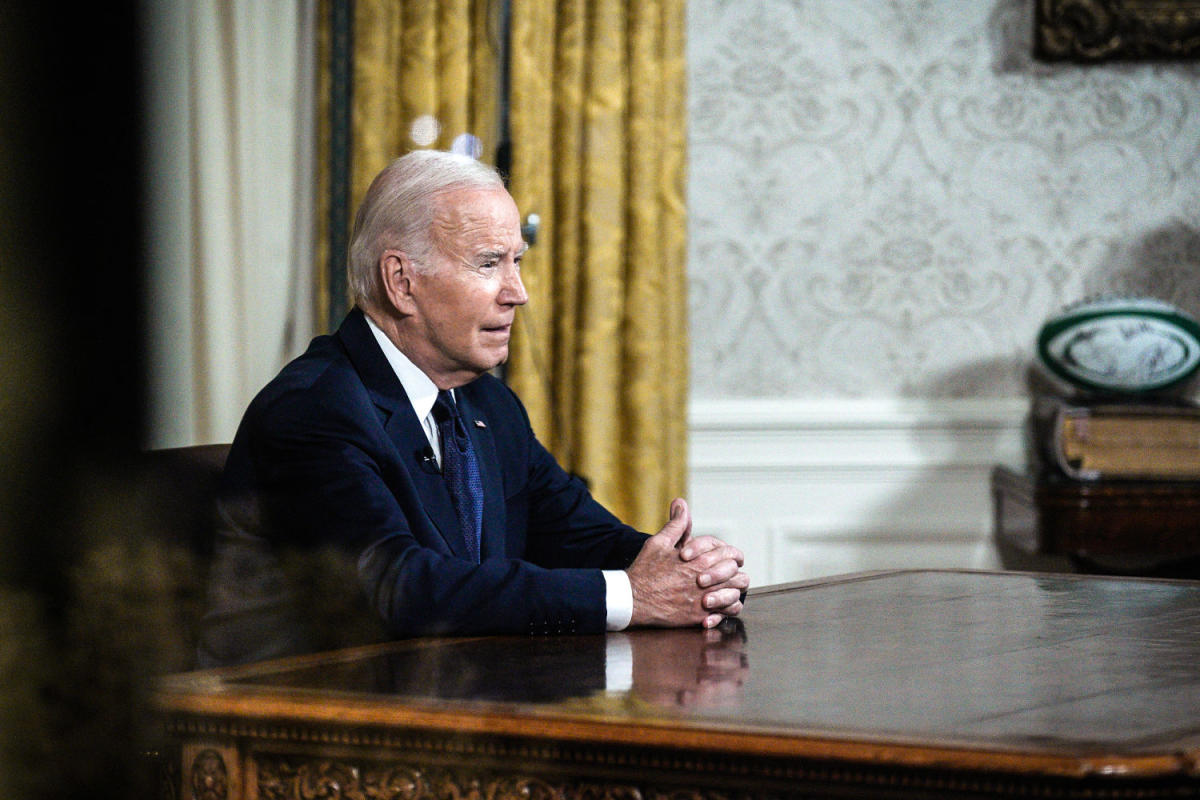Welcome to the online version of From the Politics Desk, an evening newsletter that brings you the NBC News Politics team’s latest reporting and analysis from the campaign trail, the White House and Capitol Hill.
In today’s edition, chief foreign affairs correspondent Andrea Mitchell examines whether this week marked a tipping point for President Joe Biden’s approach to Israel. Plus, senior national political reporter Jonathan Allen looks ahead to Donald Trump’s potential statement on abortion next week.
Sign up to receive this newsletter in your inbox every weekday here.
Is this a tipping point for Biden’s Israel policy?
By Andrea Mitchell
Did it take the death of seven World Central Kitchen workers to get President Joe Biden to shift his policy toward Israeli Prime Minister Benjamin Netanyahu’s conduct of the war in Gaza?
Until now, according to senior administration officials, Biden has been one of the last holdouts of his national security team on taking a harder line as the humanitarian catastrophe in Gaza has deepened, even though his reluctance to do so seemed intractable to allied world leaders and even some of his own advisers.
Do you have a news tip? Let us know
The president’s call with Netanyahu on Thursday and a virtual meeting of their advisers on Israel’s plan to invade Rafah appear to have been a turning point. Secretary of State Antony Blinken — who was on the call — broke precedent by going on camera soon afterward to cite specific steps Biden wanted Israel to take, including opening the critical Erez land crossing into North Gaza and the port of Ashdod for aid deliveries.
Blinken had been pressing for both during multiple trips to Israel and said Friday, “U.S. policy on Gaza will be determined by our assessment of Israel’s immediate action on these steps.”
Now the questions will be whether the president agrees to place conditions on military aid to his longtime ally. Several sources tell NBC News that options are being considered. The first trigger point could be if Israel does not follow through on its commitment to the Biden administration to open an additional land crossing into Gaza. The next could be if Israel decides to launch a larger-scale invasion of Rafah, ignoring Biden’s objections.
Also looming is a May 8 deadline when the Biden administration will have to provide an assessment to Congress on whether all countries, including Israel, are using U.S. weapons in compliance with international and U.S. human rights laws. In February, Biden also ordered the State Department to assess whether Israel’s assurances are credible and report to Congress.
Pressure is mounting in Congress to do exactly that — put conditions on military aid to Israel, as even more 2,000-pound bombs already in the pipeline were approved, such as the one Israel used against the Jabalia refugee camp in North Gaza on Oct. 31. Israel said they were targeting one Hamas terrorist in a tunnel under the camp, although Hamas denied it. Images from the devastated camp enraged much of Europe and the Middle East, igniting anger at the Netanyahu government only three weeks after the Hamas massacre.
It’s another turning point in a war that Hamas ignited six months ago this weekend.
Trump says he’ll take a position on abortion soon. History and politics say don’t bet on it.
By Jonathan Allen
Trump told NBC’s Gabe Gutierrez on Tuesday that he would make a statement about his position on abortion next week. If he does, it is likely to raise more questions — and political problems — than it resolves.
Trump managed to win the Republican nomination this year without clarifying his stance in the primaries, entirely side-stepping an issue that has given the GOP more conniptions — and electoral losses — than any other since he left the White House.
At times, Trump proclaims that he killed abortion protections. At others, he insists Republicans have hurt themselves by placing restrictions on the procedure. Over a broader sweep of time, he has declared himself “very pro-choice” and said that women should be punished for having abortions.
In other words, he’s given little reason for anyone to think he has any hard-wired beliefs on the issue. Which is ironic, because the Supreme Court he stocked with appointees overturned Roe v. Wade and paved the way for abortion bans across the country — delivering the No. 1 goal for social conservatives and setting off a backlash that reverberates every time an unwanted or dangerous pregnancy is forced to term.
But if not for Trump’s Supreme Court picks, Florida wouldn’t have been able to enact a ban after six weeks of pregnancy — a period during which many women do not yet know they are pregnant.
There is little reason to think that whatever Trump says in the coming days — if, he in fact says anything of substance — will clarify a concrete position. It’s hard to see how he would gain electorally from trying to mediate between warring factions of his own party. Moreover, he can’t expect that such a stand would soften opposition from critics.
Given his role in overturning Roe, Democrats will pin the most restrictive policies on him anyway.
In recent months, Trump has voiced his view that there is a consensus forming around a 15- or 16-week national ban that includes exceptions in cases of rape, incest or when the life of the mother is endangered. But his aides hint that he may choose to say that the decision should be left to voters in the states, buying him more time to avoid articulating policy. That would have the benefit of being consistent with the court’s Dobbs decision — the ruling that created the flood of abortion restrictions and political peril for the GOP.
It would also allow him to evade embracing a national abortion ban that has a climb as steep as Capitol Hill. To enact that ban, he would need Republicans not only to gain control of both chambers of Congress, but to do so by much larger margins than the rosiest GOP projections foresee. Pushing the ban could make it harder for Republicans to win the House and Senate seats they would need to make it law. And even if he won the presidency and the GOP won both chambers, and Republicans could agree to one position, a 15- or 16-week ban could not survive a Democratic filibuster in the Senate.
With all of that in mind, it would be surprising if Trump locks himself into any solid position on abortion before November’s election.
That’s all from The Politics Desk for now. If you have feedback — likes or dislikes — email us at [email protected]
And if you’re a fan, please share with everyone and anyone. They can sign up here.
This article was originally published on NBCNews.com

Amanda Smith is a dedicated U.S. correspondent with a passion for uncovering the stories that shape the nation. With a background in political science, she provides in-depth analysis and insightful commentary on domestic affairs, ensuring readers are well-informed about the latest developments across the United States.







/cdn.vox-cdn.com/uploads/chorus_asset/file/25454244/Screenshot_2024_05_18_at_12.02.42_PM.png)
